Pilot program
In 2009, the (then) Tasmanian Department of Economic Development, Tourism & the Arts (DEDTA) undertook a range of initiatives to promote the application of Lean business improvement processes by Tasmanian industry. Through a successful program of seminars and site visits, local business people were exposed to the outcomes that can be achieved through the application of Lean and other competitive systems and practices. A number of businesses expressed interest in taking a ‘next step’ toward Lean implementation.
DEDTA approached Bob Cother to learn more about a collaborative Lean Action Learning program, operating in South Australia, and a consultation process was undertaken with industry representatives to determine that the program was a ‘good fit’ for Tasmanian business.
A pilot Lean Action Learning program was conducted in the Tamar Valley region over the period October 2010 to September 2011 with funding and support from Skills Tasmania and DEDTA. Three companies were involved in the program; Tamar Valley Dairies Pty Ltd, ACL Bearing Company and Rio Tinto Alcan Bell Bay (now Bell Bay Aluminium).
Industry interest group emerges
Following on from the success of the pilot program, representatives of the participating companies sought to maintain the relationships created during the program. Business Action Learning Tasmania was formed as an unincorporated interest group and the BALT Coordinating Team articulated the mission for the group:
BALT’s mission is to support self-reliant industry development, with diverse companies cooperating to improve their profitability, develop their people and grow the Tasmanian economy.
This mission is built on three pillars; collaborative action learning, achieving important business outcomes, and the awarding of nationally recognised qualifications.
The group seeks to achieve this through running programs to implement real business improvement projects with groups of local companies.
Subsequently, a further four programs were delivered over the next five years.
Ongoing research and development of the BALT model
The action learning model that has evolved over successive programs has broadened in scope and is underpinned by a collaborative action research process of development. Programs are no longer finite and allow companies to participate on a project-by-project basis.
To date, BALT has developed into a cohort of some sixteen companies, sharing knowledge and cooperating to achieve measurable business improvement and advance the local economy.
Incorporation of Business Action Learning Tasmania Ltd
On 8 June 2017, BALT was registered as an Australian not-for-profit company limited by guarantee. The company is established to be a charity whose purpose is to advance education by delivering action learning programs in workplaces, education institutions and the community. Founding members include Bell Bay Aluminium, TasRail and CPT Engineering. The BALT Coordinating Team elected an interim board of directors to oversee the implementation of a five year business plan toward establishing BALT as a leader in the action learning community world-wide.
